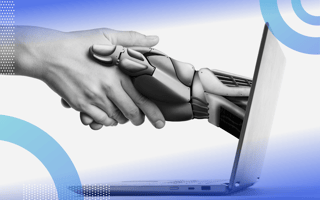Humans are typically curious by nature, but there’s a deep resource around human behavior that can be tremendously valuable as we design our strategies in business (and life, in general).
Cultural anthropologists combine curiosity and empirical science to deliver sustained value. We’re trained to interpret and translate why people do the things they do and how unconscious and overlapping motivations influence their actions, their attitudes, their approach to the myriad people, products, politics and places of everyday life. We do this by spending time in the places where people make meaning, a method of inquiry known as ethnography. It’s what gets us excited, and it’s where we impact academia and industry.
Part of our work focuses on challenging the things we take for granted and, in so doing, encouraging new ways of looking at ideas, interactions and people we may have overlooked in the forgetfulness of routine. Curiosity is our rocket fuel.
What Questions Should an AI Ethnographer Ask?
My colleague, Jay Hasbrouck, captures the spirit of the anthropological mindset when he writes, “When used as more than a research tool to expose consumer needs, ethnographic thinking helps companies and organizations build on the cultural meanings and contexts of their offerings, develop the flexibility to embrace cultural change, focus their strategies at critical cultural phenomena, and test and develop business model changes.”
Where Ethnography Comes In
For those of us in the tech sector, in particular, our focus is quite aggressively on questions around data biases, including how algorithms are constructed and, ultimately, who they advantage and who they don’t. It’s a much bigger issue than simply feeding the machine and imagining that the outputs are somehow free of judgment. They’re not.
But, who should be responsible for exploring the roots of these biases that pre-exist machine learning — biases that are already deeply embedded in culture? We hear a lot of blame in the popular press about this or that platform creating unfair advantages. Nevertheless, should we leave it to data analysts and computer scientists to untangle these social inequalities? It seems a more appropriate area of investigation for those of us who study culture and the power flows that animate it.
So we begin to ask questions. What’s fair in a data-mediated world? What role does empathy play in communicating evidence and big data? What constitutes evidence in a global context?
Placing blame on flawed algorithms and the companies on which data-driven services depend is really missing the critical point. We need to look outside tech and start to get serious about the very non-technical realities that contribute to an unequal present and, consequently, an inevitably unequal future.
We need to get serious about the reality that data isn’t raw or clean — but rather deeply reflective of the social and political circumstances from which they are pulled and to which they contribute.
I’ve been giving a lot of thought to the admittedly broad subject of AI viewed from an anthropological perspective. My main goal in doing so is to further challenge the cultural category AI (big and small), while also exploring how ethnographic methodology (direct observation/active listening) might help advance our understanding of the human and machine relationships forming here and now and tomorrow.
Specifically, I’m thinking about two main question areas.
First, a definitional focus: How might we begin to articulate an ethnography of AI? What role might AI technologies play in the service of ethnographic practice? How might (and does) ethnographic inquiry inform AI technologies?
Second, a philosophical focus: Who is responsible for bias in data, in algorithms and in outcomes? This should include discussion around how work related to AI is currently organized within tech companies today.
As companies become increasingly reliant on data-driven insights to build their offerings, market their products and guide scope for future projects, we need to get serious about the reality that data isn’t raw or clean — but rather deeply reflective of the social and political circumstances from which they are pulled and to which they contribute. It’s an exciting time to be an anthropologist working in technology where the human is deeply enmeshed with the machine.
* * *
This article was published in partnership with ADP’s Tech and Innovation Blog.





